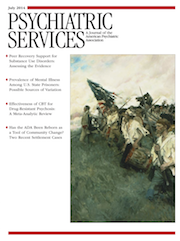People with psychotic disorders often suffer from social anxiety and self-stigmatization. Various interventions have been developed to tackle these problems, with varying effects. A promising new method is cognitive bias modification (CBM), a type of therapeutic training that targets and ultimately aims to modify harmful cognitive biases to provide a “cognitive vaccine” against negative appraisals. Research has shown that CBM training is effective in decreasing social anxiety among healthy persons with mild anxiety problems. Preliminary research results show that CBM is also a promising intervention for treating social anxiety and self-deprecating thoughts among patients suffering from psychosis. However, CBM training traditionally is a repetitive and boring computer task, and engaging patients to participate can be difficult.
In a focus group of clinicians, patients, and gaming developers, we discussed possible ways of making CBM training more attractive to people with a first episode of psychosis. In an attempt to meet the interests and preferences of our relatively young patient group, we developed a so-called serious game. Serious games are games designed for a serious purpose, combining training or education with fun. Having a long tradition in the U.S. Army, where serious games were used for training in war situations, these kinds of games have recently emerged in health care. The purpose of our serious game is to offer an attractive computer environment in which people with a first episode of psychosis can train themselves to appraise social situations positively, with the goal of decreasing social anxiety and self-stigmatization.
In the game Bias Blaster, players are offered blocks of multiple ambiguous scenarios related to social anxiety and self-stigma that can be interpreted as positive or negative; for example: “You bump into an old friend on the street. He asks you what kind of job you have nowadays. You tell him that you receive a social welfare payment and that you are in therapy. The old friend looks at you, and you notice that he. . . .” Whereas a player might tend to complete the scenario automatically in a negative direction (such as, “thinks you’re weird”), the game offers a positive alternative (“sympathizes with you”). CBM sessions are made attractive by incorporating blocks of scenarios, which are illustrated like comics, as obstacles that players need to overcome in order to gain power in the game.
Our game follows the popular format of the online “bubble shooter” game in which players need to shoot all bubbles from a board, scoring as many points as possible. Bias Blaster has three difficulty levels from which players can choose. When the board is filled with bubbles and the player is at risk of the game’s ending, a special bomb can be charged to shoot many bubbles at once. The charging happens when players complete several CBM scenarios. The more CBM scenarios completed, the more the bomb is charged. Players can choose when and how much time they want to complete CBM scenarios and when they want to switch to shooting bubbles. The game points gained can be used to buy gadgets for and to upgrade an avatar representing the player in the game.
We conducted a pilot study with seven patients who played the game. Results on the Gaming Experience Questionnaire showed that patients felt competent in playing and concentrating on the game but not very challenged by the game. Patients mentioned that “The game has a nice design and is pleasant to play,” and “The comics are funny” but that “The scenarios are very easy” and “The structure of the game levels is unclear.” With this feedback, we refined the game. The most important change was the way in which the game is introduced to patients. Instead of introducing Bias Blaster as a computer game with a serious purpose, we now emphasize that it is a therapeutic intervention with a game-like format. Our next step is to investigate the game’s effectiveness as part of a regular treatment program. Patients are instructed to play Bias Blaster once a week for 12 weeks. We have included the first 24 patients in a randomized controlled trial (
www.trialregister.nl number 15417). Patients can play Bias Blaster at home or at the health care facility whenever they choose. Computerized interventions such as this one offer a promising way to supplement or perhaps replace more expensive face-to-face interventions.

